The 6 Best Bariatric Iron Supplements for Post-Gastric Bypass Patients in 2025
We only recommend products we love and that we think you will, too. We may receive a portion of sales from products purchased from this article.
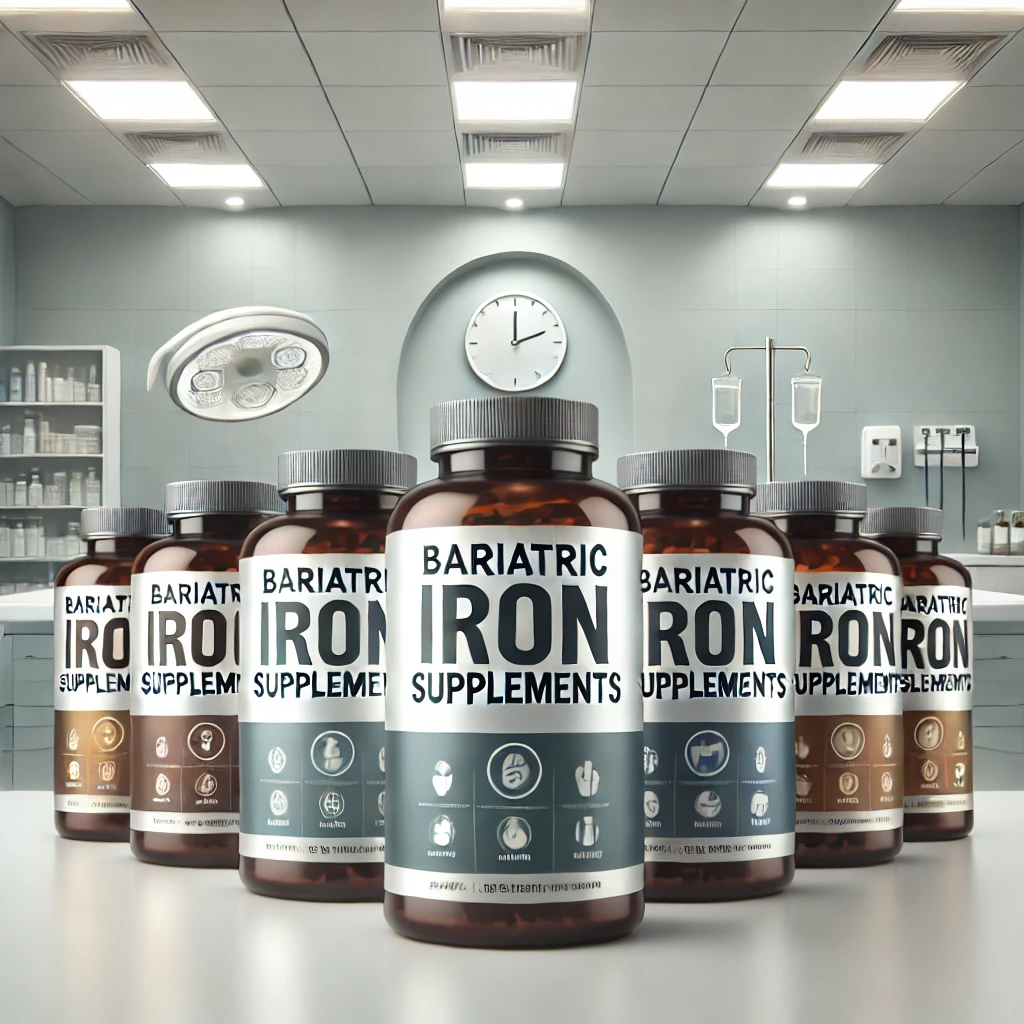
Gastric bypass surgery is life-changing—it reshapes not just your stomach but also your nutritional needs. One of the biggest challenges after surgery is maintaining healthy iron levels. With altered digestion and absorption, regular multivitamins or standard iron supplements may not cut it. Enter bariatric-specific iron supplements: tailor-made to meet the unique needs of post-surgery individuals.
In this detailed guide, We’ll dive into the 6 best bariatric iron supplements you can buy, ranked and reviewed to make your choice easy and informed.
10 Best Bariatric Multivitamins with Iron
Why Do You Need Iron Supplements After Gastric Bypass Surgery?
Why Iron Is a Non-Negotiable After Bariatric Surgery
Gastric bypass surgery isn’t just a weight-loss procedure—it’s a complete reconfiguration of how your body processes and absorbs nutrients. While the benefits are transformative, the changes to your digestive system can leave you vulnerable to nutrient deficiencies, with iron being one of the most affected. Here’s why iron is crucial and why skipping supplementation isn’t an option.
How Bariatric Surgery Affects Iron Absorption
During gastric bypass surgery, significant portions of your stomach and small intestine are bypassed. Unfortunately, these are the exact areas responsible for absorbing iron from food.
- The stomach plays a critical role in converting dietary iron into a form that your body can absorb. By reducing stomach size and acid production, the surgery makes this process less efficient.
- The duodenum, the first part of your small intestine, is a major absorption site for iron. When bypassed, your body has less opportunity to absorb this vital nutrient.
The Risks of Iron Deficiency After Surgery
Iron is essential for producing hemoglobin, the protein in red blood cells that carries oxygen throughout your body. Without enough iron, your cells don’t get the oxygen they need to function, leading to iron deficiency anemia.
Symptoms of Iron Deficiency Anemia:
- Chronic fatigue and weakness
- Dizziness or lightheadedness
- Pale skin or a “washed-out” appearance
- Brittle nails and hair thinning
- Shortness of breath during simple activities
For bariatric patients, these symptoms can quickly derail recovery and impact overall quality of life. According to research published in Obesity Surgery Journal, 30–50% of bariatric patients develop iron deficiency anemia without proper supplementation.
Prevalence Rates by Procedure:
- Roux-en-Y Gastric Bypass (RYGB): Studies report anemia prevalence ranging from 5% to 64% post-surgery. ResearchGate
- Sleeve Gastrectomy (SG): Anemia prevalence varies between 1% and 54% after surgery. PubMed
Long-Term Prevalence:
- At 10 years post-RYGB, anemia rates have been observed to increase to 57% in patients without bariatric specialist follow-up. JAMA Network
Iron Deficiency and Anemia:
- Iron deficiency is a leading cause of anemia post-bariatric surgery. One study found that 43% of patients developed iron deficiency, and 16% developed iron deficiency anemia, with a mean follow-up of 31 months. ASH Publications
Iron Supplementation: Bridging the Gap
The good news? Iron supplementation is an effective way to prevent deficiency and maintain healthy iron levels after surgery. Here’s why it’s non-negotiable:
- Diet Alone Is Insufficient
Post-surgery, your reduced stomach size limits how much you can eat. Even if you focus on iron-rich foods like lean meats, spinach, and beans, your body won’t absorb enough iron to meet your needs. - Increased Iron Requirements
Bariatric surgery patients often need two to three times more iron than the general population. Supplements bridge this gap by providing a concentrated, absorbable source of iron. - Faster Recovery and Better Energy Levels
Iron plays a direct role in maintaining your energy levels and supporting healing after surgery. A well-formulated iron supplement can help you bounce back faster and stay active throughout your recovery.
Why Bariatric-Specific Iron Supplements Are the Best Choice
Standard iron supplements might not be enough. Bariatric-specific options are tailored to your unique needs:
- Highly Absorbable Forms: Such as ferrous fumarate or carbonyl iron, which are easier on the stomach.
- Added Nutrients: Many include Vitamin C to boost absorption and reduce digestive discomfort.
- Gentle Formulations: Designed to minimize side effects like nausea or constipation, common after surgery.
Expert Opinions
Dr. Robert Kushner, a leading bariatric nutrition expert, notes:
“Iron supplementation isn’t optional for gastric bypass patients—it’s a critical component of long-term health. Choosing the right supplement can significantly reduce the risk of anemia and ensure sustained recovery.”
According to the American Society for Metabolic and Bariatric Surgery (ASMBS), post-surgery patients have significantly higher iron needs. Symptoms like fatigue, pale skin, and hair thinning are red flags you can’t ignore. Iron supplementation bridges the gap, ensuring you feel energetic and healthy while maintaining proper blood function.
Choosing the Right Bariatric Iron Supplement
Bariatric patients have unique needs due to altered digestion and absorption. Here are key factors to consider:
- Form of Iron:
- Ferrous Fumarate, Gluconate, or Sulfate: Common forms with moderate absorption but may cause gastrointestinal upset.
- Iron Bisglycinate (Chelated Iron): Better tolerated and has higher bioavailability.
- Heme Iron Polypeptide: Derived from animal sources, offering excellent absorption and fewer side effects.
- Dosage:
- Depending on individual needs, doctors often recommend 45-60 mg of elemental iron daily. In cases of severe deficiency, higher doses may be necessary.
- Combination with Other Nutrients:
- Iron absorption improves when paired with vitamin C.
- Some supplements include other necessary nutrients, like folate, B12, and zinc, which are also commonly deficient after bariatric surgery.
- Tolerability:
- Look for gentle formulations to reduce the risk of side effects such as constipation or nausea.
How to Take Iron Supplements
- Timing Matters: Take iron on an empty stomach or with vitamin C for optimal absorption. Avoid taking it with calcium or dairy, which interfere with absorption.
- Monitor Levels: Regular blood tests are crucial to ensure iron levels are maintained within the recommended range.
Top 6 Best Bariatric Iron Supplements for Post-Gastric Bypass Patients
1. Bariatric Fusion Iron Supplement
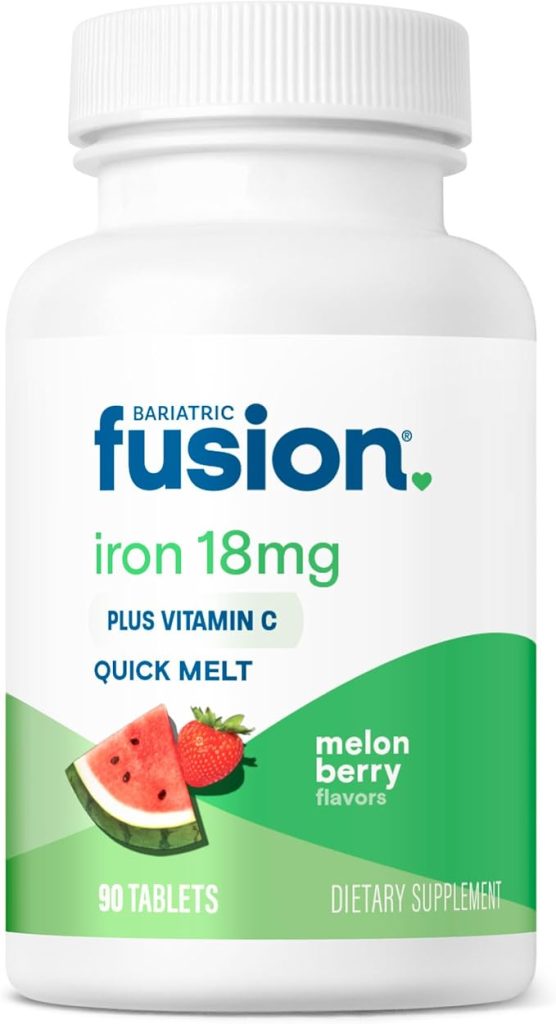
Flavor: Melon Berry | Form: Quick-Melt Tablets | Count: 90 Tablets
If there’s one product that delivers everything a bariatric patient could ask for, it’s Bariatric Fusion. Designed by a bariatric surgical team with decades of experience, this iron supplement doesn’t just meet your needs—it anticipates them. From taste to absorption to ease of use, it’s a top-tier choice for anyone navigating post-surgery nutrition challenges.
Breaking Down the Formula
Each tablet is packed with 18 mg of ferrous fumarate—a highly bioavailable form of iron that’s easy to absorb and gentle on sensitive stomachs. To enhance this absorption, the supplement also includes 36 mg of Vitamin C. This combination makes it incredibly effective at addressing iron deficiency while minimizing unpleasant side effects like nausea or constipation.
What Makes It Stand Out?
- Convenience That Fits Your Lifestyle
Quick-melt technology allows these tablets to dissolve effortlessly on your tongue. No water? No problem. Whether you’re commuting, working, or simply relaxing at home, this supplement integrates seamlessly into your day. - Tailored for Bariatric Patients
Bariatric Fusion was developed specifically for individuals who’ve undergone gastric bypass, sleeve gastrectomy, duodenal switch, or other bariatric procedures. Its formula accounts for the reduced absorption capacity common after these surgeries, ensuring you get maximum nutritional benefit. - Taste You’ll Actually Look Forward To
Melon Berry is a refreshing departure from the metallic taste associated with most iron supplements. Users rave about the flavor, making compliance less of a chore.
Affordability and Value
At just one tablet per day, each bottle provides a three-month supply. That’s hard to beat when it comes to value for money. Additionally, the product is Non-GMO, allergen-free, and free from artificial preservatives, making it suitable for a wide range of dietary needs.
User Testimonials
Here’s what some satisfied users have to say:
- “After years of struggling with nausea from iron supplements, I finally found one I can take daily. Bariatric Fusion has been a lifesaver!”
- “The taste is fantastic, and it doesn’t upset my stomach. It’s rare to find a supplement that works and tastes this good.”
Who Should Choose Bariatric Fusion?
This product is perfect for anyone seeking a reliable, effective, and easy-to-take solution to their post-surgery iron needs. Whether you’re newly recovering or managing long-term deficiencies, Bariatric Fusion is a clear winner.
2. Celebrate Iron + C Chewable
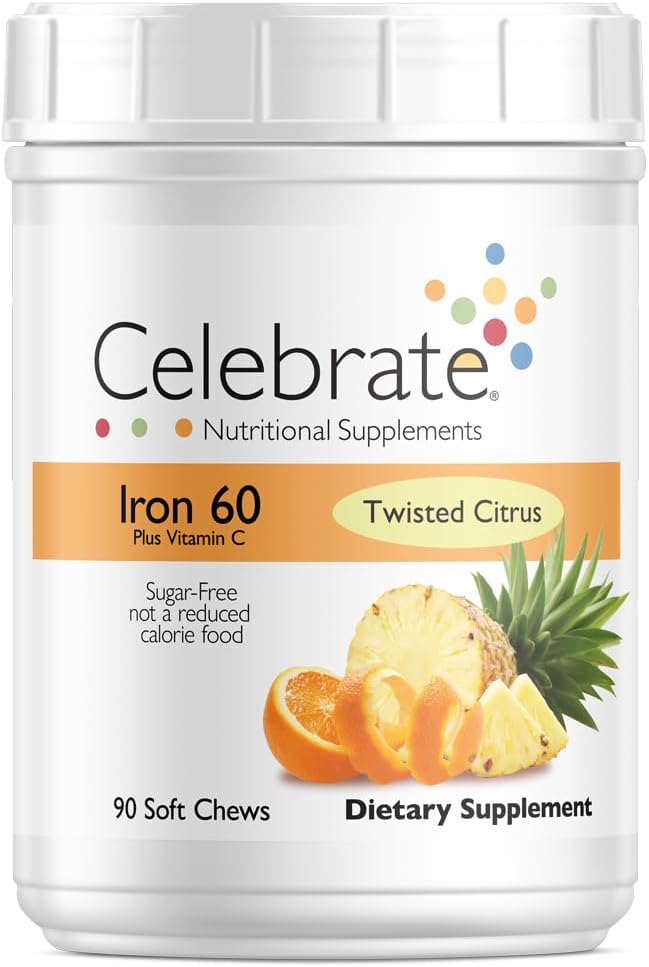
Flavor: Berry, Grape, twisted citrus, unflavored| Form: Chewable Tablets | Count: 60 Tablets
Celebrate Iron + C Chewable is proof that effective iron supplementation doesn’t have to taste bad. Designed specifically for bariatric patients, it combines high potency with a delicious grape flavor, making it a standout choice for those with demanding iron needs.
High-Potency Iron for Serious Deficiencies
Each chewable tablet delivers 30 mg of elemental iron, making it one of the more potent options on this list. It’s an excellent choice for those with severe deficiencies or higher iron requirements. Pairing iron with Vitamin C ensures your body can absorb the maximum amount possible, reducing the risk of side effects like nausea or stomach upset.
Why Users Love It
- A Flavor That Delivers
Let’s face it: most iron supplements taste awful. Celebrate breaks the mold with its smooth grape flavor that users consistently praise. Taking your daily dose doesn’t feel like a chore anymore. - Bariatric-Specific Formulation
Designed for individuals who’ve undergone gastric bypass, sleeve gastrectomy, or similar procedures, Celebrate understands the unique nutritional challenges faced by bariatric patients. Its chewable form ensures easy consumption, even for those struggling with pill fatigue. - Convenient Dosage
With one tablet per day, Celebrate offers a no-fuss solution to keeping your iron levels in check.
Potential Drawbacks
The only downside? With just 60 tablets per bottle, you’ll need to restock more often. However, for the quality and potency offered, it’s worth the investment.
User Experiences
- “This supplement saved me during my recovery. The grape flavor makes it enjoyable to take, and my iron levels have improved dramatically.”
- “A bit pricey for a 60-day supply, but the results speak for themselves. I’ll never go back to generic iron pills.”
Who Should Choose Celebrate?
If you need a higher dose of iron and value a flavorful, chewable option, Celebrate is a fantastic pick.
3. Feosol Complete with Bifera
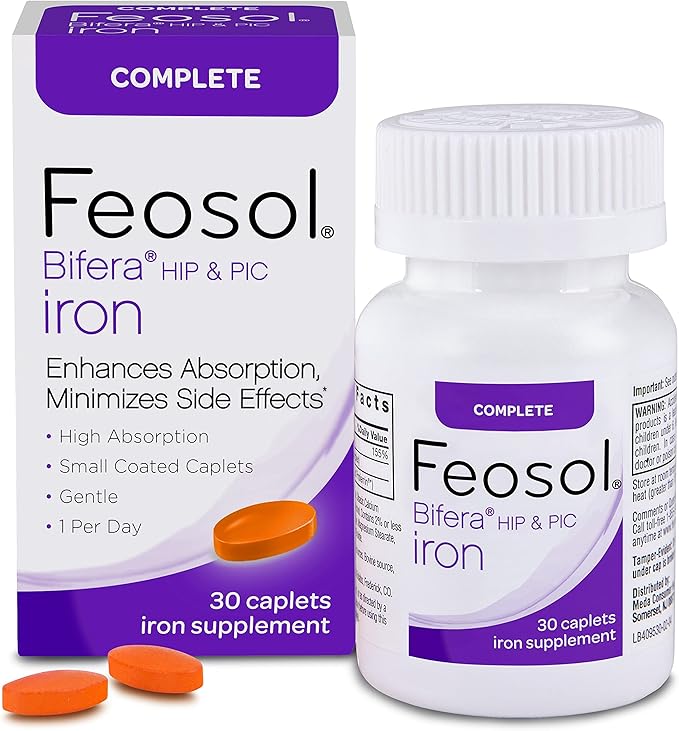
Form: Caplet | Count: 60 Caplets
Feosol Complete takes an innovative approach to iron supplementation by combining heme and non-heme iron. This dual-iron technology optimizes absorption while minimizing the common digestive side effects associated with traditional iron pills.
Why Dual-Iron Matters
Unlike most supplements that rely solely on non-heme iron (less easily absorbed by the body), Feosol combines it with heme iron, which is naturally found in animal-based foods and absorbed more efficiently. This means more iron reaches your bloodstream with less effort from your digestive system.
Features Worth Noting
- Gentle on Your Stomach
Feosol’s unique formulation is designed to reduce gastrointestinal issues like constipation, which are common with higher-dose iron supplements. - Small, Easy-to-Swallow Caplets
If you’re comfortable swallowing pills, these caplets are compact and simple to incorporate into your routine. - Ideal for Versatile Users
This isn’t just for bariatric patients—it’s also a great choice for anyone dealing with anemia or iron deficiency.
Who It’s Best For
Feosol is ideal for those seeking a scientifically advanced solution to iron supplementation, especially if they’ve struggled with digestive discomfort in the past.
4. PatchAid Iron Plus Topical Patch
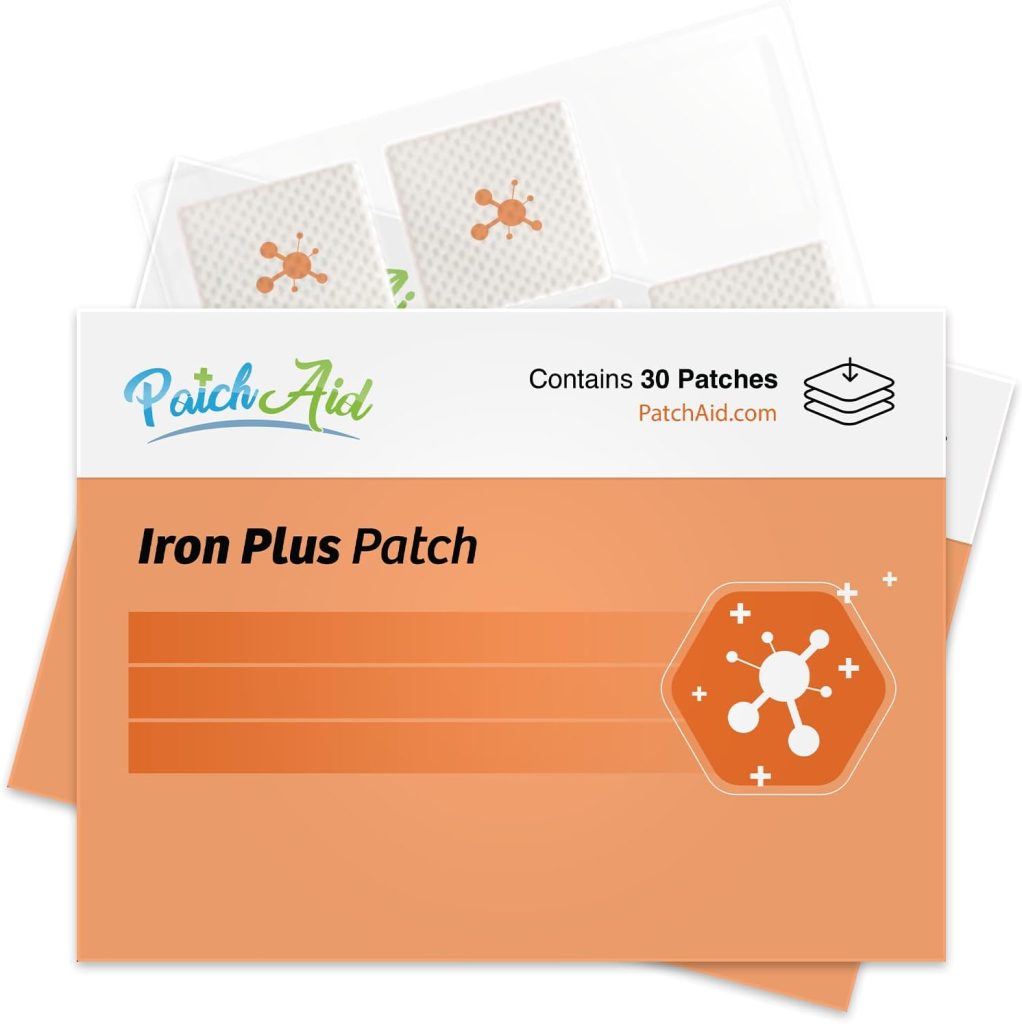
Form: Transdermal Patch | Count: 30 Patches
For those who struggle with pills, chewables, or liquids, PatchAid Iron Plus Topical Patch offers a revolutionary solution. This transdermal option bypasses your digestive system entirely, making it an excellent choice for those with sensitive stomachs or absorption issues.
Why Choose a Patch?
The PatchAid Iron Plus delivers iron through your skin directly into your bloodstream. This eliminates common digestive side effects like nausea and constipation, which bariatric patients often experience with oral supplements.
Features You’ll Love
- Iron Plus Nutritional Boost
Each patch includes not only iron but also supporting nutrients like Vitamin C, Vitamin D, and folic acid, creating a well-rounded nutritional profile. - Easy Application
Simply stick the patch on a clean, dry area of your skin—usually your upper arm or back—and go about your day. It’s lightweight, non-invasive, and perfect for busy lifestyles. - 24-Hour Release
The patch provides a steady release of nutrients over 24 hours, ensuring your body absorbs what it needs gradually without overwhelming your system.
What Users Are Saying
- “I was skeptical, but this patch is amazing. No stomach upset, and my bloodwork shows it’s working!”
- “I love how easy it is to use. I put it on before bed, and I’m good to go.”
Considerations Before Buying
While convenient, patches may not deliver as much iron as oral supplements. If you have severe iron deficiency, you might need a stronger option or combine the patch with another product under medical guidance.
Who Should Use PatchAid?
This product is perfect for bariatric patients who can’t tolerate traditional supplements or want a supplemental boost to their existing routine.
5. BariMelts Bariatric Iron
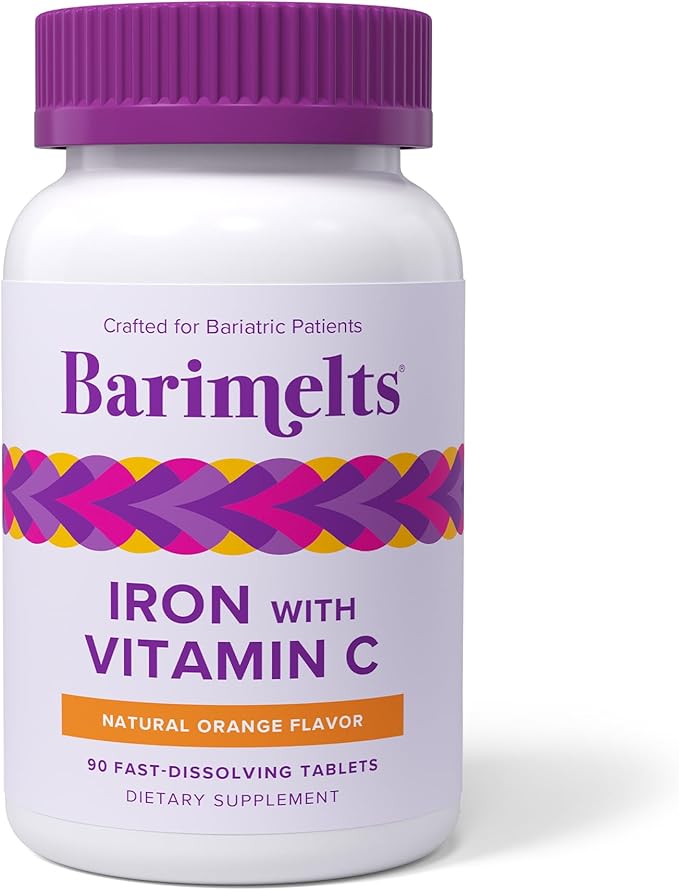
Flavor: Cherry | Form: Dissolvable Tablet | Count: 90 Tablets
BariMelts Iron is the go-to choice for bariatric patients who prioritize ease of use and flavor. Its cherry-flavored dissolvable tablets are designed to melt effortlessly on your tongue, making them incredibly user-friendly.
What Makes BariMelts Special?
- Gentle Formulation
Each tablet contains 18 mg of iron (ferrous fumarate) combined with Vitamin C. This pairing boosts absorption while remaining gentle on the stomach—a critical factor for bariatric patients with sensitive digestive systems. - Melt-in-Your-Mouth Technology
The dissolvable format eliminates the need for swallowing pills, which can be challenging post-surgery. Just pop one on your tongue, let it melt, and enjoy the subtly sweet cherry flavor. - Bariatric-Specific Design
Tailored to meet the nutritional needs of gastric bypass, sleeve gastrectomy, and duodenal switch patients, BariMelts ensures that each dose works as efficiently as possible.
User Testimonials
- “I look forward to taking my supplement every day! The flavor is amazing, and it’s so easy to use.”
- “These are a game-changer. No nausea, no hassle—just results.”
Who Should Choose BariMelts?
If you want a bariatric-friendly supplement that tastes great and is incredibly convenient, BariMelts is the perfect choice.
6. Ferretts Iron Supplement
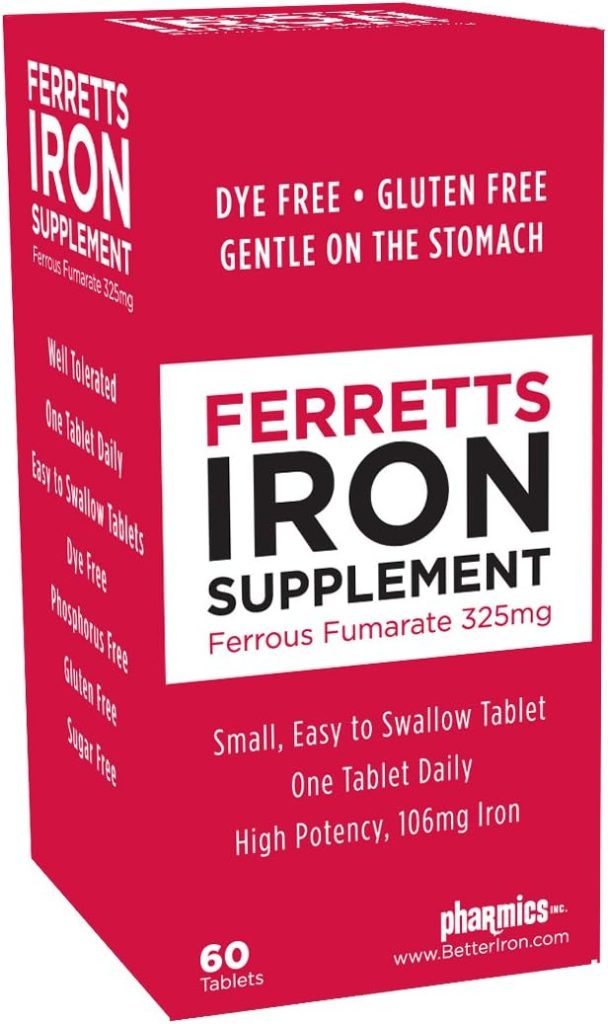
Form: Tablet | Count: 120 Tablets
When iron deficiency anemia hits hard, Ferretts Iron Supplement rises to the challenge. Packed with 325 mg of ferrous fumarate per tablet, this supplement delivers a powerful punch, making it ideal for those with significant deficiencies.
Why Ferretts Stands Out
- Maximum Potency
With a high dosage of elemental iron, Ferretts is designed to quickly replenish depleted iron stores. This makes it a go-to for patients whose lab results indicate severe anemia. - Affordable and Long-Lasting
Each bottle contains 120 tablets, providing a four-month supply at a budget-friendly price point. - Minimal Additives
Free from unnecessary fillers and artificial preservatives, this supplement focuses solely on delivering high-quality iron.
Potential Drawbacks
Its high potency can lead to stomach upset for some users, especially if taken on an empty stomach. Pairing it with food and consulting your doctor about the right dosage can help mitigate this issue.
Who Should Use Ferretts?
This supplement is ideal for bariatric patients or anyone facing severe iron deficiency and seeking a potent solution at an affordable price.
How to Maximize Iron Absorption
Optimizing iron absorption is essential for maintaining healthy iron levels, particularly for those with increased nutritional needs, such as bariatric patients. By following these strategies, you can improve how your body absorbs and utilizes this critical mineral:
1. Pair Iron with Vitamin C
Vitamin C plays a significant role in enhancing iron absorption by converting it into a more easily absorbed form.
- Good Sources of Vitamin C: Citrus fruits, bell peppers, strawberries, broccoli, and tomatoes.
- Practical Tip: Take your iron supplement with a glass of orange juice or include vitamin C-rich foods with your meals.
2. Avoid Calcium Around Iron Intake
Calcium competes with iron for absorption, reducing the amount of iron your body can use.
- Foods High in Calcium: Milk, cheese, yogurt, and fortified plant-based milks.
- Practical Tip: Wait at least two hours before or after consuming calcium-rich foods or supplements to take your iron.
3. Limit Caffeine and Tannins
Compounds found in coffee, tea, and some sodas (like tannins and polyphenols) can inhibit iron absorption.
- Practical Tip: Avoid drinking caffeinated beverages one hour before or after taking iron supplements or eating iron-rich foods.
4. Prioritize Heme Over Non-Heme Iron
Iron comes in two main forms: heme iron (from animal products) and non-heme iron (from plants). Heme iron is more bioavailable and easily absorbed.
- Sources of Heme Iron: Red meat, poultry, fish, and shellfish.
- Sources of Non-Heme Iron: Spinach, legumes, nuts, and fortified cereals.
- Practical Tip: Pair non-heme iron foods with a vitamin C-rich source to improve absorption.
5. Use Cast Iron Cookware
Cooking in cast iron pans can naturally increase the iron content of your meals, especially when preparing acidic dishes like tomato sauces or citrus-based recipes.
- Practical Tip: Incorporate cast iron cookware into your routine for an effortless boost to dietary iron intake.
6. Separate Iron from Certain Medications
Some medications, such as antacids, proton pump inhibitors, and antibiotics, can interfere with iron absorption.
- Practical Tip: Take your iron supplement at least two hours before or after medications that affect its absorption.
7. Manage High-Phytate Foods
Phytates in foods like legumes, whole grains, and some nuts can bind to iron, reducing its absorption.
- Practical Tip: Soak, sprout, or ferment grains and legumes to reduce phytate content and improve iron availability.
8. Be Consistent with Supplementation
Consistency is critical in maintaining optimal iron levels. Even small, regular doses can help build and sustain your iron stores.
- Practical Tip: Set a daily schedule for taking your iron supplements to make it a regular part of your routine.
9. Monitor Your Progress
Iron needs vary by individual, and regular bloodwork can help track your levels.
- Practical Tip: Work with your healthcare provider to adjust your iron intake based on your lab results and symptoms.
Final Thoughts on Choosing Your Bariatric Iron Supplements
Each of these Bariatric Iron Supplement is designed to address the unique challenges of post-gastric bypass nutrition. Whether you value taste, convenience, or potency, there’s an option tailored to your needs.
Still unsure?
- If taste and convenience matter most, Bariatric Fusion or BariMelts are standout choices.
- Struggling with pills? Try PatchAid for a stomach-friendly alternative.
- Need maximum potency? Ferretts is your best bet for serious deficiencies.
Frequently Asked Questions About Bariatric Iron Supplements
1. Why is iron supplementation necessary after gastric bypass surgery?
Gastric bypass surgery alters your digestive system, bypassing parts of the stomach and small intestine responsible for absorbing nutrients, including iron. Without sufficient iron, you risk developing iron deficiency anemia, leading to symptoms like fatigue, dizziness, and weakened immunity. Supplements ensure your body gets the iron it needs to stay healthy and maintain energy levels.
2. How much iron do I need after surgery?
The American Society for Metabolic and Bariatric Surgery (ASMBS) recommends 45–60 mg of elemental iron daily for most bariatric patients. However, the exact amount can vary based on your individual needs and bloodwork results. Always consult your doctor or dietitian for personalized recommendations.
3. What’s the difference between bariatric-specific iron supplements and regular ones?
Bariatric-specific supplements are formulated to address the unique absorption challenges of post-surgery patients. They often include:
- Highly bioavailable forms of iron, like ferrous fumarate or carbonyl iron.
- Complementary nutrients, like Vitamin C, to enhance absorption.
- Gentle formulations designed to reduce side effects like nausea or constipation.
Regular iron supplements may not provide these benefits and can be harder to tolerate for bariatric patients.
4. Can I take a multivitamin instead of a dedicated iron supplement?
While many bariatric multivitamins include some iron, it’s often not enough to meet post-surgery requirements. Adding a dedicated iron supplement ensures you’re covering all bases, especially if blood tests show signs of deficiency.
5. Why is Vitamin C included in many iron supplements?
Vitamin C enhances the absorption of non-heme iron, the type found in most supplements. It converts iron into a form that’s easier for your body to absorb and helps minimize side effects like constipation.
6. Are there any side effects of taking iron supplements?
Some common side effects include:
- Constipation: Can be reduced by choosing bariatric-specific formulations or increasing fiber intake.
- Nausea: Often alleviated by taking supplements with food or opting for gentler forms like ferrous fumarate.
- Metallic taste: This can vary by product; flavored chewables or dissolvables like BariMelts help mask it.
If side effects persist, consult your healthcare provider for alternatives.
7. When should I take my iron supplement?
For best absorption, take iron on an empty stomach or at least two hours before or after meals. However, if it upsets your stomach, taking it with a small amount of food is okay. Avoid consuming iron with calcium-rich foods, coffee, or tea, as they can hinder absorption.
8. Can I take too much iron?
Yes. Excessive iron intake can lead to a condition called iron overload, which may cause symptoms like joint pain, fatigue, or organ damage in severe cases. Stick to your doctor’s recommended dosage and never self-prescribe high doses of iron.
9. What’s the best type of iron for bariatric patients?
Ferrous fumarate, carbonyl iron, and chelated iron are commonly recommended for their high absorption rates and minimal side effects. Chewable or dissolvable forms are particularly helpful for bariatric patients who have difficulty swallowing pills.
10. How long will I need to take iron supplements after surgery?
Iron supplementation is typically a lifelong commitment for bariatric patients. Regular bloodwork can help monitor your levels and determine if adjustments to your dosage are needed.
11. Can I combine iron supplements with other medications?
Iron can interact with certain medications, including antacids, calcium supplements, and some antibiotics. To avoid interactions:
- Take iron supplements at least two hours apart from these medications.
- Inform your healthcare provider about all the medications and supplements you’re taking.
12. Do iron supplements cause weight gain?
No. Iron supplements do not contain calories and won’t directly lead to weight gain. Any changes in weight after starting iron supplementation are likely related to other factors, such as improved energy levels and activity.

